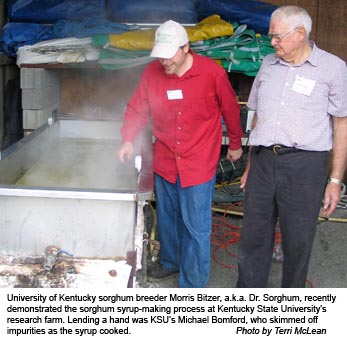UK’s ‘Dr. Sorghum’ Cooks up Interest in Age-Old Treat
UK’s ‘Dr. Sorghum’ Cooks up Interest in Age-Old Treat

It’s an age-old sweet treat prepared in a timeless manner. Yet, sorghum syrup appears to be gaining new ground in popularity in Kentucky and beyond.
This mild-flavored syrup, first made in the Colonial days, is being “rediscovered” as a nutritious flavoring, a seasoning ingredient and a sugar substitute, said Morris Bitzer, sweet sorghum breeder for the University of Kentucky College of Agriculture. There is hardly a food served today that the thick, amber-colored syrup won’t improve, he added.
“It’s so versatile,” said Bitzer while demonstrating his syrup-making prowess at Kentucky State University’s research farm in Franklin County.
Sorghum syrup is also 100-percent natural, which largely accounts for its recent comeback, he said. It is made from the natural juice extracted from sorghum cane. The juice is cleansed of impurities and concentrated by evaporation in open pans. The syrup retains its natural sugars and other nutrients.
“The main thing is that it’s the most nutritious sweetener. It’s very high in potassium, very high in iron and very high in antioxidants. It’s one of the top six foods in antioxidants,” Bitzer said as he handed out fresh-out-of-the-oven biscuits dripping with sorghum syrup.
One thing it’s not, however, is molasses. Molasses is a byproduct of sugarcane.
“Don’t call it molasses,” Bitzer said. “Sorghum molasses is a colloquial term because so much sorghum used to taste like black strap molasses. They didn’t make good syrup. They made strong dark black stuff. We’ve learned how to make better sorghum syrup in the last 10 to 15 years.” Bitzer, a.k.a. Dr. Sorghum, travels the state each fall with cooking pan in tow to promote sorghum syrup’s goodness. But as much as he likes to tout the edible benefits of the syrup, he also hopes to win over farmers – especially former tobacco farmers – who might be looking for an alternative crop. Sorghum cane is a drought-resistant, heat-tolerant member of the grass family that grows well in Kentucky and other southeastern states. It’s planted in May or June and harvested in September through a killing frost.
Bitzer, a.k.a. Dr. Sorghum, travels the state each fall with cooking pan in tow to promote sorghum syrup’s goodness. But as much as he likes to tout the edible benefits of the syrup, he also hopes to win over farmers – especially former tobacco farmers – who might be looking for an alternative crop. Sorghum cane is a drought-resistant, heat-tolerant member of the grass family that grows well in Kentucky and other southeastern states. It’s planted in May or June and harvested in September through a killing frost.
“This (sorghum cane) will produce more income per acre than tobacco,” he insists.
Indeed, at an average of $20 per gallon and 150 gallons per acre, sorghum syrup production can be a profitable enterprise. In 2005, Kentucky’s sorghum syrup production was worth more than $10 million.
Yet, Bitzer said, the current acreage – about 3,000 acres – is just over one-half of Kentucky’s potential. The average producer grows fewer than 5 acres of sorghum cane, while the largest Kentucky producers grow more than 50 acres.
“Sorghum syrup has the potential for over $2,000 net per acre, and the market is there for many more producers,” he said.
Sorghum syrup is also a known commodity. It was introduced into the United States in 1852 and has, at one time or another, been produced in every one of the contiguous 48 states.
Sorghum cane is grown extensively for syrup production in the southeast. Kentucky is the No. 1 state in sorghum production and is one of eight states in the southeast and Midwest that produce about 90 percent of the total U.S. output. The University of Kentucky is the primary supplier of sweet sorghum seed for the world, Bitzer said.
There appears to be interest in international production, as well, but not so much for producing syrup; rather, for producing ethanol. Ethanol is an alcohol-based alternative fuel that can be made from such agricultural crops as sorghum, sugarcane, corn, barley and wheat.
“All countries are interested in ethanol production, and sorghum can produce more ethanol per acre than any other crop,” Bitzer said.
Whether he’s handing out mini-biscuits dripping with sorghum syrup or talking cane-growing techniques, Bitzer stays busy in his unofficial role as sorghum ambassador. He is the executive secretary for both the Kentucky and the National Sweet Sorghum Association in addition to his post-retirement appointment as a sorghum breeder.
“I’m the guy they call,” he said. “In the last five, six or seven years, I’ve just been snowballed.”
